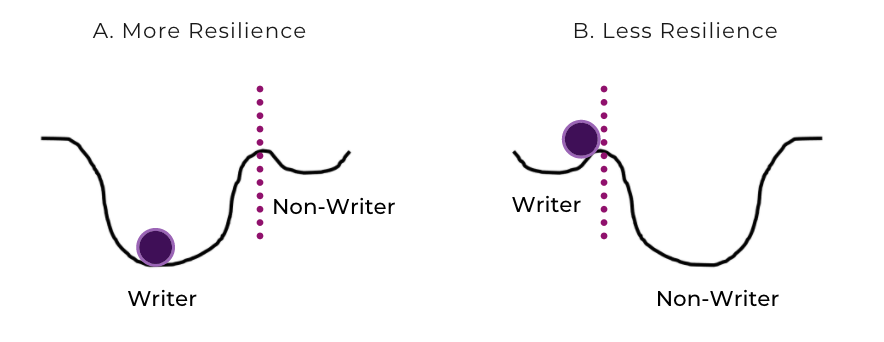On the Slow-Variable Game

By Christine Carron
I’m forging ahead on the Great Reading Reset of 2022 and working my way through three books this week, one of which is Resilience Thinking: Sustaining Ecosystems and People in a Changing World by Brian Walker and David Salt. This book, which is about systems theory and resilience thinking applied to five ecological case studies, is thought-twirling in the best possible way. My brain has been lighting up right, left and center with the cross-over applications to the writing adventure.
What is resilience?
The definition Walker and Salt use for resilience is the ability of a system to absorb change and disturbances, and still retain its basic structure and function—its identity (p. 113). Think of a lake that gets murky due to an algae bloom but retains the ability to get back to clear water. That’s resilience.
There is a threshold, however, that if crossed, results in the lake being in a state of permanent murkiness. So we have a clear lake identity (desirable), a murky lake identity (undesirable, unless you are algae or an algae eater), and the threshold between those two identities.
Walker and Salt emphasize that they are not as concerned with the speed of the recovery from a disturbance, as much as the system’s ability to recover at all. And that often what causes a system to cross the threshold into the less desired state is a slow-moving variable whose significance is not fully understood or appreciated . . . until it is too late.
Now, at this point, you might be wondering: systems, disturbances, thresholds, ability to recover, slow-moving variables? What does any of this have to do with the writing adventure?
To answer that question, I have to share a not-so-fun moment and the resulting fallout that occurred on my writing adventure . . .
A Triggering Event
A few years ago, I received a harsh critique on a work-in-progress from an author I greatly admire. I was a mess in the hours, even days, afterward. A sobbing, disassociating, panicky mess. It felt awful and overwhelming. Embarrassing, too.
Fortunately, I was pretty much immediately intellectually aware that my response was not commensurate with the facts of the situation. And I knew that meant that old trauma wounds/patterns had been triggered by the author’s comments.
Unfortunately, you cannot intellectualize your way out of trauma. It’s a feeling, experiential process. And though I had (and have) the support of a great therapist who has lots of experience in trauma work, the impact of those comments (the disturbance) on me (the system) was so severe, I was unable to make any significant headway on new stories for years.
Years.
Basically I was a lake with a massive algae bloom, and I wasn’t sure if I was ever going to get back to clear water again, i.e., recover. Had I crossed the threshold from Writer to Non-Writer?
The Ball in the Basin
To visualize how wobbly I felt in my Writer identity, let’s look at a systems theory concept Walker and Salt present. It’s a metaphor called the ball in the basin. Imagine two basins side-by-side with a ball rolling around in one of them.
In a resilient system, the ideal identity basin (the basin of attraction) is deep and the ball is nowhere near the edge, i.e. nowhere near the threshold between the desired identity and the not desired identity.
 In a less resilient system, the desired identity basin is shallow, and the ball is whirling around the edges, very close to the threshold. Any new disturbance (even a slight one), could cause the ball to hop the rim and end up in the other basin, the not desired one. I was definitely like that ball, teetering around the edge of my Writer identity basin after the critique trigger.
In a less resilient system, the desired identity basin is shallow, and the ball is whirling around the edges, very close to the threshold. Any new disturbance (even a slight one), could cause the ball to hop the rim and end up in the other basin, the not desired one. I was definitely like that ball, teetering around the edge of my Writer identity basin after the critique trigger.
But I didn’t hop.
Somehow, I clung to the edge of my Writer identity even though I wasn’t writing any new stories. I kept trying (I am a trooper), but it was like wading through molasses. A total, uninspired slog. Which begs the question, if I wasn’t able to produce new work, which was making me feel so not like a Writer . . .
What kept me from hopping basins?
It goes back to that slow moving variable idea. The one that is often missed until it is too late.
In the lake, the slow-moving variable is the phosphorus levels in the lake sediment. When the sediment phosphorus level gets overloaded, the lake loses its ability to clear out excess phosphorus in the water, which perpetuates (and feeds) algae blooms, and that becomes the new normal.
Murky Lake identity is now the basin of attraction. That’s where the ball stays. And that means: The undesirable identity is now the resilient one. (Yikes!)
I’m convinced the reason I did not jump, even though I was very, very wobbly, is because I inadvertently focused on the key slow-moving variable of a resilient Writer identity: equilibrium skills, i.e., our mental and emotional health.
More than producing pages or any writerly talent we may have, it is the strength of our equilibrium skills that will keep us solidly on the writing adventure. Those are the skills that give us the grit and determination to keep going, even when disturbances shake us to our core.
Which means, what felt like a very dark hour on my adventure was actually a gift. After that critique, I slowed down to do important repair work. Work that will serve me on the writing adventure far more than an uninspired, forced manuscript.
Was it sometimes a struggle to stand for myself and my need to take space and time to heal deeper trauma wounds over these past few years? Yes. And does a part of me still wish we could have done this whole emotional health business and have a shiny new manuscript done? Uhm . . . double yes.
But the end result of focusing on the slow-moving variable of my equilibrium skills is that I not only made my Writer identity basin deeper, I got that ball way, way down from the edge. The algae is gone. Clear lake back. I am a Writer. No matter that I do not have a shiny new manuscript in hand.
(Yet.)
How do I know for sure that I am solidly in the Writer identity basin? Two reasons.
First, because another massive disturbance came in a week ago. That is a story for a future post, but key to this discussion is that I was able to process the disturbance in a day, rather than weeks to years. That’s resilience. Deep resilience.
The second reason is because I’m percolating on not one, but three new story ideas. And instead of feeling like I’m in a hellish slog with them, it feels easy, exciting, and even . . . groovy. Which means not only is my writerly identity basin deep again, the ball is nowhere near the threshold.
Shiny new manuscript here I come!
Why is this all so important?
I am sure you know that the writing adventure is not always a walk in a pebbled-path park. Seriously, sometimes it feels like an evil genius is sitting in a backroom, cackling and saying, “How can we trip these writers up today? Oh, the possibilities! Bwah-ha-ha!”
From rejections, to struggles to land particular writing skills, to critique group conflict, to imposter syndrome, to plain old doubt, there are seemingly endless potential disturbances on the adventure.
So resilience is important, and equilibrium skills are key to that resilience. They are the critical slow variable that will keep your Writerly identity basin deep and that ball far away from the Non-Writer threshold. No matter if you are in a dry spell or not.
There is a lot of messaging floating around in the writerly universe that real writers are writing and producing all the time. And if we are not, we are not really committed, or we are dabblers, or we don’t have what it takes.
Even here at Goodjelly we are focused on encouraging you to write. To get your work on the page and move it forward.
And that is important. But as in most things in life, there is a paradox. If we only optimize the writing on the writerly journey, which feels so seductively logical, then we may be stressing the system in a way that is not useful for productivity long-term. Making ourselves less resilient and more susceptible to the slings and arrows that will come our way.
To stay anchored deeply in our Writer identity basin, i.e., to stay on the adventure, we have to attend to both our writing skills and to the slow variable of our equilibrium skills.
So if you are struggling at the moment, if you are feeling like algae is blooming in the lake of your writerly adventure, slow down and ask yourself what is the best way to deepen your basin and get that ball away from the edge.
The answer to that question may be to get your derrière in the chair and churn out some pages. But the answer may also be to take a walk, or meditate, or give your pet a belly-rub. It could even mean engaging in a longer term process, such as working with a coach or therapist. Where you work to untangle whatever it is that is making you feel wobblier then you want to be, or need to be, on the writerly adventure.
No matter the time commitment of your selected action, nor any (temporary) impact on your words-to-page count, do not despair. You are still in the Writer basin, and making sure you stay there in a courageous and strategic way. You are not strong-arming short-term productivity, you are ensuring long-term staying power (i.e., clear-lake'ability) for the writerly adventure.
Which means you are playing the slow-variable game. And what a grand game it is.
The Goodjelly Prompts of the Week
- Post-in-Action Prompt: How would you currently assess your Writerly identity basin? Is it deep with the ball nowhere near the edge? Or is it shallow with the ball teetering on the edge? If it is the latter, what small action might you take to find even just a little more equilibrium in the moment?
- Scene Prompt: Write a scene where your main character is struggling to process tough feedback from a coach, or a teacher, or a friend. How does the character’s upset manifest? Do they lash out at the person, or do they flee and turn all their upset and anger on themselves? Or possibly even freeze? Go for the visceral reaction, even if they try to hide it.
- Journaling Prompt: Do you agree that equilibrium skills are the critical slow-moving variable of the writerly adventure? If so, what are some of the ways you find equilibrium when you are triggered (in small ways or big)? If not, what would you say is the slow-moving variable of the writing adventure?
- Connection Prompt: Check in with your writerly peeps and share the strategies and tactics that you each use when disturbances throw you out of balance.
Don't miss a single dollop of Goodjelly
Subscribe for the Latest Blog Posts & Exclusive Offers!
You can easily unsubscribe at any time.


